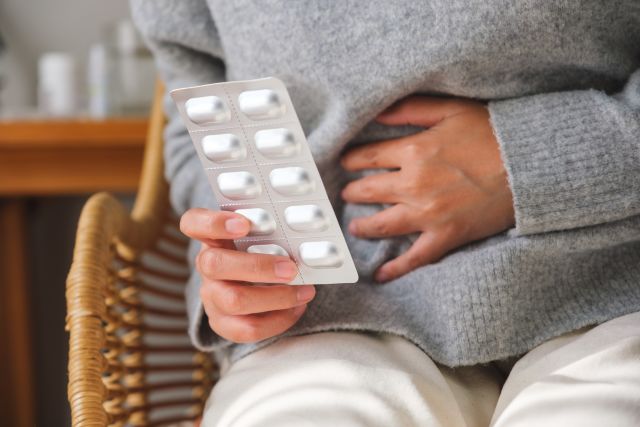Updated on April 28, 2025.
Heartburn is uncomfortable and painful, and can get in the way of your daily life. Luckily, there are medications that can help. But research suggests that long-term use of one medication type, proton pump inhibitors (PPIs), could potentially increase the risk for chronic kidney disease and end-stage renal failure.
Chronic kidney disease (CKD) occurs when the kidneys have become damaged and cannot properly do their job of filtering blood and removing waste and urine from the body. Renal failure refers to the last and most severe stage of CKD, when kidneys are working at less than 15 percent of the capacity of healthy, young kidneys. With renal failure, dialysis or a kidney transplant is needed.
In addition to CKD and renal failure, other kidney problems that have been associated with using PPIs for long periods include:
- Hypomagnesemia, or low magnesium levels from releasing too much from the kidneys
- Acute kidney injury, which can lead to a sudden decline in kidney function that may be reversible
- Acute interstitial nephritis, or swelling of the kidneys
What is heartburn?
Heartburn, or indigestion, is a common issue for many people. “Heartburn is a burning sensation in the center of the chest,” says Manmeet Padda, MD, a gastroenterologist in McKinney, Texas. It’s caused by stomach acid creeping up the esophagus, creating an uncomfortable, burning sensation.
Padda says a common source of heartburn is gastroesophageal reflux disease (GERD), also known as acid reflux, which can also lead to another health issue called reflux esophagitis. Heartburn is a symptom of both conditions, but reflux esophagitis is also characterized by inflammation of the esophagus, which is usually discovered by a biopsy.
“If someone is having heartburn symptoms more than three times per week or they’re having problems swallowing, experiencing a change in their voice, or have a chronic cough or frequent laryngitis, I’ll arrange for an upper endoscopy exam with possible biopsies to further evaluate the exact reason for these symptoms,” Dr. Padda says. Experiencing heartburn fewer than three times per week or after a large meal is normal, he adds.
Chronic heartburn is uncomfortable and puts you at risk for a variety of complications, such as Barrett's esophagus (damage to the lining of the esophagus), esophageal cancer, and esophageal strictures (a narrowing of the esophagus caused by scarring).
Two types of heartburn medication
PPIs reduce the amount of stomach acid made in the cells in the lining of the stomach. Aside from controlling heartburn, PPIs are also used to treat stomach ulcers and esophageal damage.
The U.S. Food and Drug Administration (FDA) advises that over-the-counter PPI use be limited to a 14-day course for up to three times per year. Prescription PPIs are largely intended for short-term use as well—usually 4 to 12 weeks.
Padda recommends using PPIs for two to three months for heartburn without complications and for three to four months for stomach ulcers. “Unfortunately, we’ve seen patients on PPIs for many years,” he says. “I always try to stop PPIs if there’s no clear indication to continue.”
The long-term use of PPIs, beyond the few months it may be prescribed, could be problematic for people with and without kidney disease. Research has shown that many patients who already have CKD are prescribed PPIs for longer periods than approved by the FDA.
Many other non-kidney side effects have also been linked to PPIs, such as nutritional deficiencies, increased risk for heart attack, and bone loss. They have also been tied to infections, such as community-acquired pneumonia and a bacterial infection called Clostridioides difficile (also known as C. diff), which can cause diarrhea and colitis.
Another class of drugs called H2 blockers work like PPIs by reducing the amount of stomach acid made by cells in the stomach lining. However, the two types of drugs affect different parts of the cells. H2 blockers usually work faster and don’t get in the way of nutrient uptake as much as PPIs, but they wear off more quickly than PPIs. H2 blockers are also thought to have fewer long-term complications.
Treat heartburn—with and without drugs
When it comes to heartburn, your first step toward relief is to see your healthcare provider (HCP) and go over treatment options. If your HCP prescribes an H2 blocker or PPI, be sure to follow the instructions carefully and don’t take them longer than directed. Always talk to your HCP before stopping any medication early, as this can cause rebound symptoms.
If you have concerns about medication use, talk to your HCP about changing medications or other options that may help improve your symptoms.
You can control some lifestyle factors to help improve heartburn symptoms:
- Take steps to manage your weight. Obesity is a risk factor for heartburn because it increases pressure in the stomach. That pressure can push open the lower esophageal sphincter (a group of muscles that keeps your esophagus closed), which will let the stomach acid creep up into the esophagus.
- Avoid certain trigger foods. Certain foods commonly cause heartburn, including coffee, chocolate, alcohol, and spicy foods. If you’re troubled by heartburn after eating some or all of these, avoid them.
- Eat earlier. Eat dinner at least three to four hours before going to bed. Having a full stomach while lying in bed can cause stomach acids to creep up the esophagus.
- Adjust other eating and exercise habits. Don’t bend over or exercise too close to eating. Eat smaller meals throughout the day and try to include more protein and less fat in meals.
- Avoid certain pain medications. Limit aspirin, ibuprofen (Advil, Motrin), or naproxen (Aleve, Naprosyn). Take acetaminophen (Tylenol) instead. When taking a medication, drink plenty of water.
- Keep your head up when you sleep. Raise the head of your bed at least 6 inches with a wedge-shaped insert under your mattress. Or, use books or bricks to prop up the legs at the head of your bed. Gravity will help keep the stomach acid down. Sleeping on your left side also protects you from acid reflux.
- Take steps to quit smoking. Cigarette smoke can weaken the lower esophageal sphincter.
- Avoid tight-fitting clothing. A cinched waist can put pressure on the stomach and push stomach acid up.
- Practice relaxation techniques. Stress may make heartburn worse. Mind-body exercises like yoga, meditation, deep breathing, and tai chi can help improve stress.
Talk to your HCP about your treatment and lifestyle options when it comes to heartburn. As with all medications, take them only as directed.







